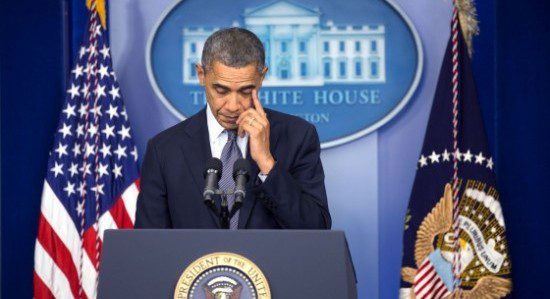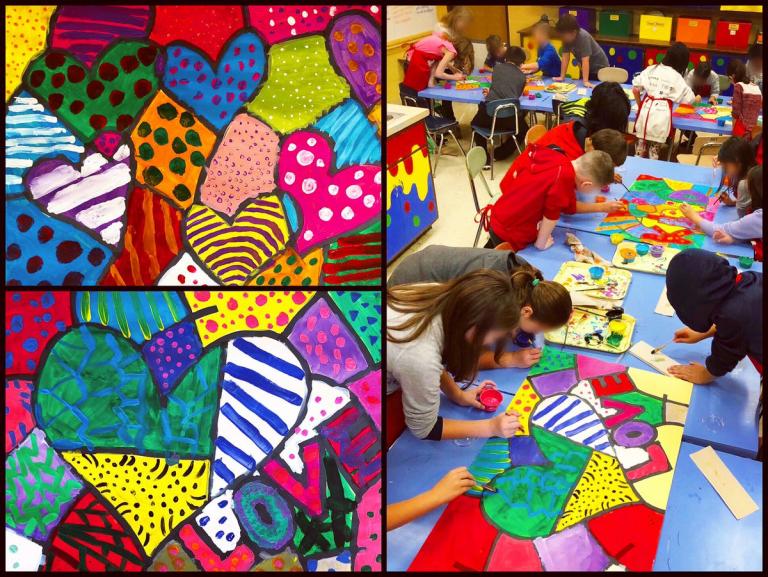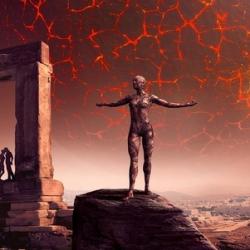
On Tuesday, just over a month after shootings in San Bernardino and Colorado Springs, President Obama announced a number of actions that he plans to take by executive order to enact several gun control policies, including expanded background checks (a policy that has widespread support).
This post is not about that, though. The president did something else during his announcement that was just as remarkable to me: He cried.*
Right on cue, of course, the criticism came, and it has been just about as much aimed at his demeanor in the announcement as it has his policy changes.
The fact that people are mocking President Obama for crying when talking about mass killings, particularly the Newtown shooting (he was also tearful following that attack), makes me — perhaps ironically — absolutely furious. Part of it is that this is just an opportunistic attack, a chance for those ideological opposed to the president to attack him as weak and impotent. (Some have also claimed that the tears were a put-on, but I find this insinuation so absurdly implausible given the video and the president’s private meetings with Sandy Hook parents after the Newtown shooting that this will be the last I mention it in this post.)
But part of it is that this kind of attack carries with it a toxic notion of what it means to be strong and to be a man.
I have two sons. My older son is almost ten, and when the horrific murders occurred at Sandy Hook Elementary in Newtown, CT, in December of 2012, he was in first grade — the same as the twenty students who were slaughtered. That connection has never left me as a parent. Every time the anniversary rolls around, as it did almost a month ago, I nearly break down and cry thinking of how that could have just as easily been my own precious child. More than that, though: These children were precious, innocent lives, no matter whose children they were.
I do not cry because I am weak. I cry because I am human, because I feel.
But that’s not what I picked up as a child, when I was a sensitive kid often moved to tears and relentlessly bullied and mocked for it by my peers. I learned then that crying was weakness, that it was unacceptable, that I deserved mockery and ostracism for it. As a result, I learned to cope with it by replacing the tears with anger — you know, an emotion that is acceptable for boys and men to express. These are lessons that I have fought hard to unlearn and lessons which I never want my sons to learn.
For all his faults as a president (and I genuinely do have many criticisms of his policies as president), I think President Obama has succeeded at this: He is an amazing role model. Here is our head of state, our commander-in-chief, a full-grown man not afraid to express his emotions in front of a nation that largely thinks of masculinity as chest-beating and machismo. I can’t imagine if, as that sensitive child, I had seen one of the most powerful people in the world crying openly and without shame. That crying was not only permissible but a perfectly reasonable response to such senseless suffering, even if it is accompanied by anger. Maybe I would not have had to endure a social context where I had to condition myself to respond with anger and fury rather than tears because that was an acceptable response for a boy.
After all, is it really such a travesty that the leader of our country is so upset about children being murdered that it brings him to tears? Should he just stand up there like some stone cold Vulcan and tell us all that it’s no big deal, that it’s just part of living in America?
Put away the partisan BS for a second and recognize this: Even if you think Obama’s policies are the wrong step, at least he’s doing something because it hurts him to see the same tragedies happen again and again.
If it doesn’t hurt you, too, I don’t know that I can understand your humanity at all.
Image by Lawrence Jackson via Wikimedia (public domain)
*For the record, I thought that mocking John Boehner for getting teary-eyed on occasion was also out of line, and I’d like us to stop doing that to politicians and public figures in general, especially the ones we don’t like.










